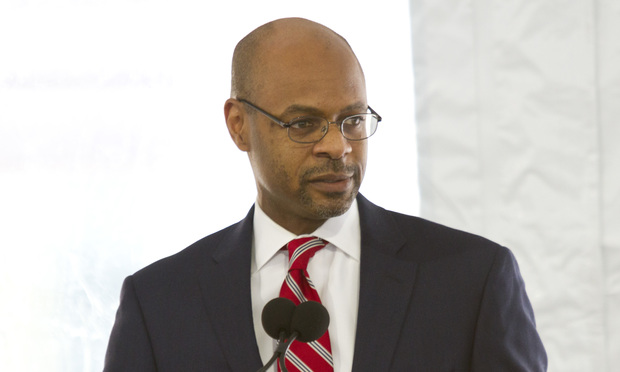Chief Justice Extends State Judicial Emergency as Shelter-in-Place Orders Expire
As businesses across Georgia have begun reopening, state Supreme Court Justice Harold Melton has extended the statewide judicial emergency, continuing the suspension of civil and criminal trials and barring courts from impaneling new trial or grand juries.
May 04, 2020 at 12:38 PM
3 minute read
 Chief Justice Harold Melton, Supreme Court of Georgia. (Photo: John Disney/ALM)
Chief Justice Harold Melton, Supreme Court of Georgia. (Photo: John Disney/ALM)
The chief justice of the Supreme Court of Georgia has extended a statewide judicial emergency for the second time, even as Gov. Brian Kemp lifted the state's shelter in place restrictions and allowed businesses to reopen.
Chief Justice Harold Melton's announcement, issued Monday morning, extends the judicial emergency through June 12. It was scheduled to expire May 13. June 12 is the date the governor's shelter-in-place recommendation for medically fragile people, including the elderly, expires.
Melton's new order will continue the suspension of all criminal and civil jury trials through June 12 and also bars courts from summoning and impaneling new trial and grand juries. He said the suspensions are necessary because of the need for recommended social distancing and to protect the health of large groups of people who are typically assembled in response to jury summonses.
Melton said he was extending the state judicial emergency because, "The courts are different from most private establishments and public places in that we compel people to attend court proceedings, and that requires us to be extra cautious."
Melton intends to sign an order codifying his announcement later this week.
Melton made his announcement as Georgia's COVID-19 cases continued to rise. The state on Monday reported 29,045 confirmed COVID-19 cases, 5,429 hospitalizations and 1,192 deaths.
The governor has allowed small businesses and the state's beaches to reopen if they met specific sanitation and social distancing guidelines. Kemp's directives specifically superseded municipal or county restrictions, but they do not extend to the judiciary.
A Dougherty County probate judge died after a juror who had contracted the coronavirus served on a weeklong trial at the county courthouse in March, and at least four other judges across the state have been sickened with the virus.
Melton stressed in his announcement that Georgia courts remain open to handle critical and essential court services. His new order will urge courts across the state to develop plans for restoring noncritical court operations that can be conducted remotely by a combination of videoconferencing or adhering to social distancing and other guidelines currently recommended by the Centers for Disease Control and Prevention and the Georgia Department of Public Health.
Melton also urged the courts to increase the use of technology to conduct remote judicial proceedings as a preferred alternative to having in-person proceedings. The state Supreme Court and the Georgia Court of Appeals last month instituted remote oral arguments via Zoom.
NOT FOR REPRINT
© 2025 ALM Global, LLC, All Rights Reserved. Request academic re-use from www.copyright.com. All other uses, submit a request to [email protected]. For more information visit Asset & Logo Licensing.
You Might Like
View All
Georgia Republicans Push to Limit Lawsuits. But Would That Keep Insurance Rates From Rising?
5 minute read
A Plan Is Brewing to Limit Big-Dollar Suits in Georgia—and Lawyers Have Mixed Feelings
10 minute readTrending Stories
Who Got The Work
J. Brugh Lower of Gibbons has entered an appearance for industrial equipment supplier Devco Corporation in a pending trademark infringement lawsuit. The suit, accusing the defendant of selling knock-off Graco products, was filed Dec. 18 in New Jersey District Court by Rivkin Radler on behalf of Graco Inc. and Graco Minnesota. The case, assigned to U.S. District Judge Zahid N. Quraishi, is 3:24-cv-11294, Graco Inc. et al v. Devco Corporation.
Who Got The Work
Rebecca Maller-Stein and Kent A. Yalowitz of Arnold & Porter Kaye Scholer have entered their appearances for Hanaco Venture Capital and its executives, Lior Prosor and David Frankel, in a pending securities lawsuit. The action, filed on Dec. 24 in New York Southern District Court by Zell, Aron & Co. on behalf of Goldeneye Advisors, accuses the defendants of negligently and fraudulently managing the plaintiff's $1 million investment. The case, assigned to U.S. District Judge Vernon S. Broderick, is 1:24-cv-09918, Goldeneye Advisors, LLC v. Hanaco Venture Capital, Ltd. et al.
Who Got The Work
Attorneys from A&O Shearman has stepped in as defense counsel for Toronto-Dominion Bank and other defendants in a pending securities class action. The suit, filed Dec. 11 in New York Southern District Court by Bleichmar Fonti & Auld, accuses the defendants of concealing the bank's 'pervasive' deficiencies in regards to its compliance with the Bank Secrecy Act and the quality of its anti-money laundering controls. The case, assigned to U.S. District Judge Arun Subramanian, is 1:24-cv-09445, Gonzalez v. The Toronto-Dominion Bank et al.
Who Got The Work
Crown Castle International, a Pennsylvania company providing shared communications infrastructure, has turned to Luke D. Wolf of Gordon Rees Scully Mansukhani to fend off a pending breach-of-contract lawsuit. The court action, filed Nov. 25 in Michigan Eastern District Court by Hooper Hathaway PC on behalf of The Town Residences LLC, accuses Crown Castle of failing to transfer approximately $30,000 in utility payments from T-Mobile in breach of a roof-top lease and assignment agreement. The case, assigned to U.S. District Judge Susan K. Declercq, is 2:24-cv-13131, The Town Residences LLC v. T-Mobile US, Inc. et al.
Who Got The Work
Wilfred P. Coronato and Daniel M. Schwartz of McCarter & English have stepped in as defense counsel to Electrolux Home Products Inc. in a pending product liability lawsuit. The court action, filed Nov. 26 in New York Eastern District Court by Poulos Lopiccolo PC and Nagel Rice LLP on behalf of David Stern, alleges that the defendant's refrigerators’ drawers and shelving repeatedly break and fall apart within months after purchase. The case, assigned to U.S. District Judge Joan M. Azrack, is 2:24-cv-08204, Stern v. Electrolux Home Products, Inc.
Featured Firms
Law Offices of Gary Martin Hays & Associates, P.C.
(470) 294-1674
Law Offices of Mark E. Salomone
(857) 444-6468
Smith & Hassler
(713) 739-1250








